Midnight on the Marne
by Sarah Adlakha
[Book]
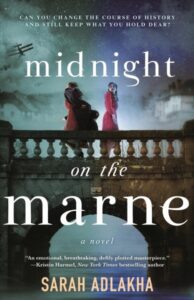
view/request
An unlikely series of events repeats itself, giving one of the participants the opportunity to change the future by sacrificing his past. Wartime in occupied France is made difficult by rationing, persecution, and fear, particularly for French nurse (and spy) Marcelle Marchand and American soldier George Mountcastle. They are immediately drawn to each other, then separated by circumstance and the Great War. Following Germany’s victory, Marcelle and George reconnect, and live in France with their cobbled together family of survivors, including George’s comrade Philip and Marcelle’s sister Rosalie. Hiding their vegetable garden and black market activities from government agents and living as well as they can, they find happiness where possible. After they are caught and punished, George somehow finds himself once again at a critical point in the Battle of the Marne, several years earlier. George and Philip have spent many years contemplating what might have happened if a single decision had been made differently, and now George has the opportunity to find out.
Framed by the narrative of Marcelle’s daughter reading her journal many years later, readers will be drawn in by the details of an alternative post-World War I history, and also pleasantly set adrift by the conflicting information presented in the journal and the known details of Marcelle’s life and history. Offer this to fans of alternative history, war stories, and what-ifs.
Reviewed by Alene
Tagged: Alternative history, Fiction, Science fiction, World War I
The Long Way to a Small, Angry Planet
by Becky Chambers
[Book]
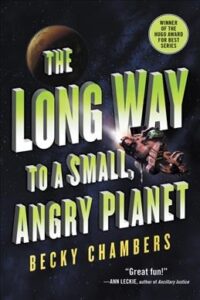
view/request
The Long Way to a Small Angry Planet begins when Ashby Santoso, the captain of a tunnelling ship, hires a young woman from Mars to be the ships first clerk. Rosemary Harper joins the ship’s small crew, which, prior to her arrival, was just the captain, the ships computer, two techs, the pilot, the navigator, an algaeist, and the kindly Dr. Chef, who serves as both the ships doctor and its chef. We see the crew through Rosemary’s eye’s as they take on an unprecedent contract which requires them to travel the long way around to a distant planet near the galactic core.
The galaxy portrayed in The Long Way to a Small Angry Planet is full of diverse and intelligent life. It’s a vision of the future much like that portrayed in Star Trek–there’s still plenty of misbehavior and conflict, but overall most folks have found ways to get along. We meet diverse intelligent species, from the lizard-like Aandrisk to the clam-like Harmagian. The tone of the book is light hearted and whimsical–it’s not as outrageous or as tongue-in-cheek as The Hitch-Hiker’s Guide to the Galaxy, but Douglas Adams fans will certainly find much to appreciate here. And, while established science fiction fans will appreciate the numerous homages to classic science fiction (I was delighted by reference to Ursula K. Le Guin and Vernor Vinge), it is also approachable for those new to science fiction.
Some may complain that The Long Way to a Small Angry Planet isn’t sufficiently profound. It doesn’t chart new territory in terms of scientific ideas or paint some novel vision of the future we have never seen before. These criticisms are valid. But it does introduce us to interesting ideas while allowing to get to know a cast of characters that we can genuinely like, and it does so while painting a refreshingly optimistic view of the future that is a pleasure to read. The Long Way to a Small Angry Planet is the first in a series, and I look forward to reading more.
Reviewed by Ben
Tagged: Fiction, Science fiction
Elevation
by Stephen King
[Book]
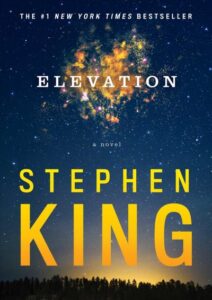
view/request
A quick read by a master of his craft, Elevation by Stephen King has all the best traits of the author in a short, easy to read format–perfect for a rainy afternoon! In typical Stephen King fashion, the story is set in Castle Rock where the day-to-day life of the locals seems just that…day-to-day. Scott Carey is part of those everyday challenges with one exception; he is slowly losing weight without getting any thinner. As his affliction becomes a gift, he faces the fact that he may be leaving Earth soon and wonders what he can and will leave behind. For readers, there are lessons to be learned and allegorical themes to be questioned. Stephen King is at his finest here and this short book leaves a lasting impression.
Reviewed by Elizabeth
Tagged: Fantasy, Fiction, Maine, Science fiction
Race for the Galaxy
by Tom Lehmann
[Library of Things]
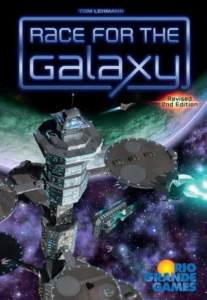
view/request
Build a galactic civilization! This incredibly clever and evocative card game (for 2-4 players) has you exploring, settling worlds, developing industries, and producing and trading goods. It’s a competitive game, but interactions with your fellow players are limited. There is a lot of skill involved and there are opportunities to affect your fellow players. Your resources are cards you draw from a facedown pile, so there is no competition there—but each turn you choose a phase to play, and all players get to benefit from that phase. The trick to coming out on top? Choosing phases that benefit you more than they benefit the other players! Each phase—explore, develop, settle, consume, and produce—has its uses, and the player that chose the phase gets a special bonus. It’s a fun mechanic, and one that can be quite exciting as the game nears its end—on the last turn, will you get a chance to both settle and develop? You can only choose one!
The game cards are rich with information: the cost to play them, the points they are worth, and symbols and text indicating what bonuses they give during each phase of play. The system of symbols is elegant and concise but takes some getting used to—the game comes with a large reference card for each player that you will find useful when learning the game, in time you will realize you don’t need it any longer, but it is invaluable when learning the game. The game cards also have wonderful art which I continue to enjoy game after game.
One of the best things about this game is its simple mechanisms and setup. There are only two components: cards, and victory point tokens. Victory point tokens represent extra points at game end. Cards are multipurpose and represent everything else in the game. Cards are your currency—you discard cards from hand to pay for things. Cards are your worlds and developments—when you settle or develop you pay the cost and place the card in front of you, adding it to your civilization. And cards are the goods produced by industry and traded in commerce—a card placed under a world is a good which you can trade (discard to draw more cards into your hand) or consume (discard to draw more cards or gain victory point tokens).
It’s also a pretty quick game once you are familiar with it. My girlfriend and I play often, and we almost always play multiple games in a sitting. Why not? The game is out, quick to setup, quick to play, and it’s lots of fun!
Reviewed by Ben
Tagged: Board games, Game, Science fiction, Strategy
She Wouldn’t Change a Thing
by Sarah Adlakha.
[Book]

view/request
Maria Forssmann is thirty-nine years old, a successful psychiatrist with a charming husband, two beautiful daughters, and a son on the way, when she inexplicably wakes up in her seventeen-year-old body. Desperate to return to her life in the future, Maria finds herself committed to a mental health facility where she meets a doctor who may be able to help her. He’s also a time traveler and knows how this has worked for others. She’s returned to this time and place for a reason, and only completing her mission will send her back. Miles away in another state, her future husband’s family is about to suffer a terrible tragedy. Maria has knowledge that would allow her to prevent it, and doing so would also alter the future and thus erase her marriage. The choice before her is impossible, and she must make a decision.
Sarah Adlakha’s debut is a truly compelling read, making the reader consider what they would do if offered a second chance, how they might deal with a difficult choice, and what is most important in life. The characters are relatable, the story is gripping, and the blend of domestic fiction with a hint of science fiction is just plain great. Offer it to fans of Kate Atkinson’s Life After Life, Jo Walton’s My Real Children, and book clubs.
Reviewed by Alene
Tagged: Fiction, Science fiction
Project Hail Mary
by Andy Weir
[Book]
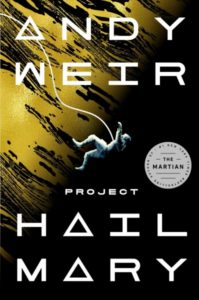
view/request
If you liked Weir’s The Martian you will love Project Hail Mary. This is a tale of a good, but flawed man who has to think his way out of a seemingly impossible situation. A very plausible story, set in the near future, with more heart than The Martian because not only does the main character have to save himself, he has to save others. Science nerds will love the internal ruminations as the protagonist overcomes each problem. Non-nerds might learn some physics, painlessly.
Reviewed by Linda
Tagged: Fiction, Science fiction
Fall or, Dodge in Hell
by Neal Stephenson
[Book]
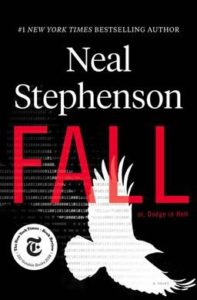
view/request
This is a cheeky poke at nerdy types and downright funny if you are one (with a sense of humor). Stephenson’s written a thoroughly enjoyable send-up of geek culture. Still underneath this near-future tale of the desire for immortality he asks some big questions and reflects on contemporary societal divisions and where they might lead.
Reviewed by Linda
Tagged: Fiction, Science fiction
All Systems Red
by Martha Wells
[Book]
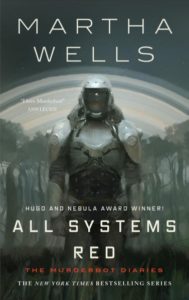
view/request
A charming story about a heavily weaponized semi-biological robot that calls itself “Murderbot”? Yes! An armed and armored security unit that has hacked its governor-module allowing it to act independently may sound like the terrifying killer robot from a “kill all humans” story from the age of classic sci-fi, but in Martha Wells’ Murderbot Diaries the AI in question is an awkward and kind-hearted, if incredibly sarcastic and anti-social, hero of an extended coming-of-age story. Murderbot just wants to be left alone to enjoy its favorite serials on the entertainment feed, but life keeps getting in the way and in the process Murderbot grows as a person, forming relationships and learning more about what it means to be alive than it could ever know from The Rise and Fall of Sanctuary Moon or Timestream Defenders Orion.
The series begins with All Systems Red, a short novella that introduces Murderbot and some of the key humans who will play a part in its life. The series continues with Artificial Condition and is now a series of six books, with more on the way. Highly recommended.
Reviewed by Ben
Tagged: Action, Coming-of-age, Fiction, Humor, Science fiction
Alienation
by Inés Estrada
[Graphic Novel]

view/request
Alienation is a cinematic and upsetting vision of humanity’s immediate future after climate collapse. In this sci-fi body horror, the colonizers and capitalists of today own the biotechnology that allows Eliza and Carlos to all but exist physically in a vast virtual world. The so-called non playable characters of this virtual reality seem to be evolving past artificial intelligence. Estrada’s monochrome illustrations, beautiful and appropriately mind-bending, feel like the perfect means to explore body sovereignty in a world where technology is created by and for those in power.
A cautionary and escapist tale.
Reviewed by Callie
Tagged: Comics, Fiction, Horror, Science fiction
Levar Burton Reads
by Levar Burton
[Online Resource]
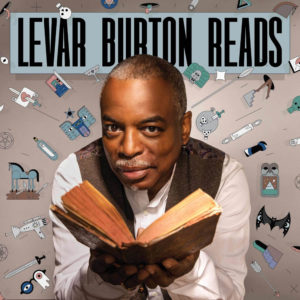
view/request
Levar Burton’s podcast has a tagline that embraces superlatives: “The Best Short Fiction, Handpicked by the Best Voice in Podcasting”. That may be taking things a bit far, but I am loving the stories Levar picks, and I can’t think of anyone I would rather hear read them. Perhaps that’s because I grew up on Reading Rainbow, but whatever your generation, if you enjoy short fiction read allowed, I urge you to check out Levar Burton Reads.
The podcast is impeccably produced, with sparing use of subtle soundscapes that enhance the storytelling. The stories are mostly science fiction and fantasy, but the selections are always of an accessible sort—you don’t need to be a fan of these genres to appreciate these well-told tales. And the authors are diverse, including both classic well-established writers and new writers of all races and genders. Levar always takes a brief moment to tell you about why he selected the story and what it means to him, and I invariably find I appreciate what he has to say.
So, whether you are looking for new authors and ideas, some great bed time stories, an impeccably produced podcast, or just the comfort of hearing Levar’s voice, give it a listen.
Reviewed by Ben
Tagged: Fantasy, Fiction, Podcast, Science fiction, Short stories
Foreigner: A Novel of First Contact
by C. J. Cherryh
[Book]
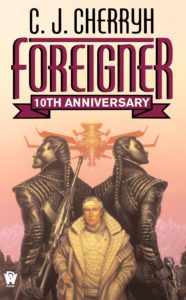
view/request
The subtitle of C. J. Cherryh’s novel Foreigner is “a Novel of First Contact”. The novel begins with a brief prelude in which a starship is flung off course and and its passengers and crew find refuge on a previously unknown world where their first encounter with the local inhabitants has a fairly promising start. This is not a typical first contact story, however, because the novel then jumps several centuries into the future, and we find that relations between the indigenous population and the foreigners are mired in misunderstandings and ignorance.
As it turns out, the indigenous Atevi and the foreign humans found they had a common interest in slowing down contact between their two peoples. After some disastrous misunderstandings a treaty is formed to limit human-Atevi contact. According to the treaty the humans are given an island on which to live, the Atevi have the rest of the world, and contact between the two species is channeled through a single human translator/diplomat known as the paidhi. This worked well; for generations humans and Atevi both prospered, and for generations of paidhi the job consisted of attending meetings and writing dictionaries. Foreigner tells the story of Bren Cameron, a young paidhi whose plans for a quiet life of linguistics and tedious but routine bureaucracy must be exchanged for intrigue, politics, and outright violence—and he doesn’t even know why. Cherryh’s narration alternates between Bren’s awkward interactions with his Atevi hosts, which increasingly involve attempted assassinations, espionage, and uncertain alliances, and his internal monologues as he tries to make sense of his increasingly incomprehensible situation. Suddenly, things are changing very rapidly. Bren is the only human with a chance of comprehending what the changes mean to the Atevi. Is Bren the world’s only hope at keeping peace?
Foreigner is the first novel in a long series (nineteen novels have been published so far) and is perfect for folks that like long character arcs, anthropological sci-fi, deliberate pacing, and complex relationships.
Reviewed by Ben
Tagged: Fiction, Science fiction
Passage
by Connie Willis
[Book]
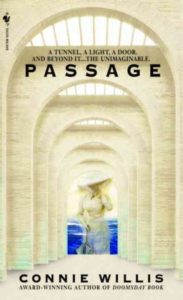
view/request
This is a difficult-to-classify tale of a medical researcher studying near death experiences. An interesting cast of characters of different races and backgrounds populate the novel and the story takes several turns, mostly unexpected. The politics and gossip and in a hospital setting are realistically portrayed. For mystery lovers who don’t mind a touch of medical-science-fiction. And for the philosophically inclined lover of escape fiction. A bit of a spooky read, and not everyone lives happily ever after. I found the main character a bit exasperating. But I had trouble putting it down until the end.
Reviewed by Linda
Tagged: Fiction, Mystery, Science fiction












